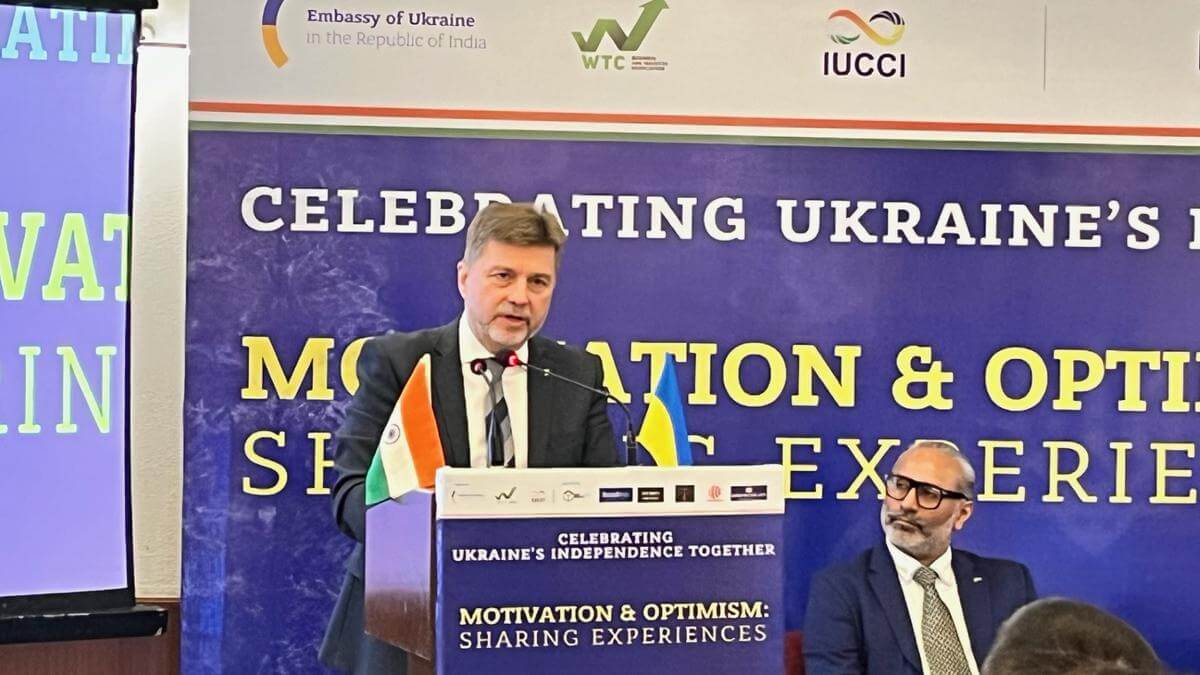Kyiv has invited New Delhi to join the post-war reconstruction efforts in Ukraine.
During an event in the Indian capital, Ukrainian Ambassador Oleksandr Polischuk called on the world’s largest democracy to participate in reconstruction efforts in Kyiv and appreciated the humanitarian assistance provided by India to Ukraine.
Overview
The event was held on Friday to mark Ukraine’s Independence Day, which is celebrated on 24 August.
At the event, Polishchuk mentioned that the two sides are discussing details for Indian participation in implementing the 10-point peace process in Ukraine.
He said, “We motivate India to participate in the post-war reconstruction of Ukraine. It is not only in humanitarian component, but also business-to-business, which is mutually beneficial.”
The 10-point peace plan, in which India has been invited to participate, was first proposed by Ukrainian President Volodymyr Zelensky at the G20 Summit in Indonesia in November 2022.
We motivate India to participate in the post-war reconstruction of Ukraine, Ukrainian Ambassador Oleksandr Polishchuk says, @dperi84 reportshttps://t.co/XJutTpjTTF
— The Hindu (@the_hindu) September 2, 2023
The plan calls for restoring security around the Zaporizhzhia nuclear power plant in Ukraine, food and energy security, releasing prisoners, and restoring Ukraine’s state borders with Russia, among other things.
At the event, Polishchuk thanked India for providing humanitarian aid to Ukraine.
He also invited Indian students to come to Ukraine to resume their education, stressing that the government had shifted educational institutions to safer areas.
The ambassador highlighted that his country and its civilians are continuing to recover from the damage caused to the infrastructure by the war.
Additionally, he called on Indian military manufacturers to participate in the upcoming Defence Industries Forum in Ukraine.
Trade and Businesses
At the event, the India-Ukraine Chamber of Commerce and Industry (IUCCI), a bilateral chamber focused on India and Ukraine, and the WTC Business and Industry Association signed a memorandum of understanding (MoU).
The MoU aims to promote business and trade between the two countries.
Yulia Klymenko, a Ukrainian Member of Parliament and the first deputy head of Ukraine’s transport and infrastructure committee, addressed the event virtually.
She invited Indian companies to help in the reconstruction of the war-torn nation.
Ukrainian MPs and scholars pitched for greater India-Ukraine cooperation and urged Indian companies to participate in the reconstruction of Ukrainian infrastructure at a hybrid event here. Speaking on the occasion, the newly appointed ambassador of Ukrainehttps://t.co/ynCxYvGEmO
— MSN India (@msnindia) September 3, 2023
Mentioning that there was scope for a first-mover advantage for Indian companies, Klymenko said, “If you are coming in first, there is a risk but one gets more profit.”
India in Ukraine
India has attempted to maintain a neutral stance in the Russia-Ukraine conflict and has repeatedly reiterated PM Narendra Modi’s stance that this is “not the era of war.”
While its decision not to join Western sanctions against Russia has drawn flak from America and Europe, it has managed to sustain its balancing act.
India has continued to support Ukraine, especially with its humanitarian efforts, sending medical equipment, medicines, sleeping bags, and tents to the crisis-hit country.
Recently, Indian National Security Advisor Ajit Doval visited Saudi Arabia to attend the two-day summit on the Ukraine War, to which Russia was not invited.
At the G7 summit in May, PM Modi called the conflict an “issue of humanity” during his meeting with Zelensky.
However, India has not invited Ukraine to the upcoming G20 Summit in New Delhi.
Further, New Delhi has repeatedly abstained from voting on issues, such as condemning Russia’s aggression, at the UN General Assembly while expressing concern about the conflict.
Moreover, Indian trade with Russia has touched record highs since the war began, with Moscow becoming New Delhi’s fifth-largest trading partner, dealing in oil, grains and defence equipment.
India’s decision to maintain strategic neutrality in the conflict aligns with its traditional stance of exercising an independent foreign policy.

